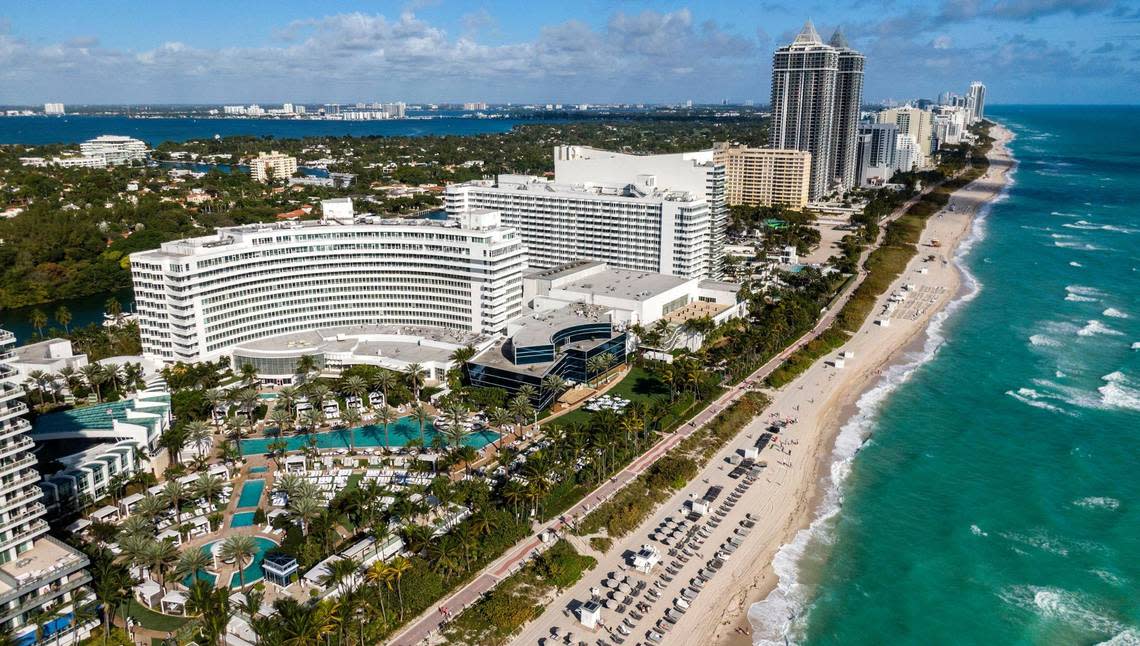Casinos are still a bad idea for Miami Beach. Yes, even at the Fontainebleau | Opinion

It happens every few years: feverish talk of bringing casinos and gambling to Miami Beach. It’s happening again now. And again, it’s an idea that should die quickly.
New bills proposed for consideration during the 2024 Florida legislative session, Senate Bill 1054 and House Bill 1127, pose a serious threat to the quality of life on Miami Beach and by paving the way for casinos — against the will of the cities and residents, who have banned them.
Gambling opponents have said the bills seem designed to bring casinos to the Fontainebleau and to Donald Trump’s Doral resort. What a terrible idea.
For those pushing for casinos, the beauty of the proposed bills is that they would allow gambling operators to relocate their current permits to new locations within 30 miles, overriding the wishes of the cities of Miami Beach and Doral.
For example, Jeffrey Soffer, whose family owns the Fontainebleau, has an existing gambling permit at Hallandale Beach’s Big Easy Casino that would become transferable to the Fontainebleau, if the bills are passed.
In other words, even though Miami Beach decided against casinos in 2017 (and Doral followed suit in 2021) and even though a constitutional amendment — passed statewide in 2018 — gave voters the exclusive right to authorize casino gambling expansions outside of tribal lands, the Legislature is trying to find a way around all that. That’s wrong.
Dan Gelber, the former mayor of Miami Beach and a longtime opponent of casino gambling expansion, called the legislative actions “an existential threat to our community.”
Miami Beach Commissioner Alex Fernandez, in an opinion article for the Miami Herald earlier this month, also rejected the idea, saying a casino would bring traffic to already overburdened streets and more public safety concerns.
“Casinos are known for low wages, attracting organized crime and money laundering, and causing societal ills including drug abuse, prostitution and gambling addiction, fundamentally impacting communities,” he wrote.
Here’s why all this is happening now:
In 2021, a $500 million deal negotiated by Gov. Ron DeSantis with the Seminole Tribe of Florida said the tribe could offer online sports betting across the state, which has just begun. As part of the agreement, the tribe said it would not oppose new casinos more than 15 miles from the tribe’s gambling hubs.
Some saw that provision as a favor by Florida Republicans to GOP presidential candidate Trump and Soffer.
The Miami Herald reported this week that Soffer has made hefty donations in recent months to the campaign coffers of Florida lawmakers who could help him achieve his longtime goal of opening a casino inside the iconic hotel, according to an article by reporter Aaron Leibowitz published last week.
Groups tied to Soffer donated more than $300,000 last year to PACs that support state legislators, including nine Miami-Dade Republicans, according to campaign finance reports filed this week. Among the contributions: $15,000 in September to Principled Moral Conservatism, a PAC chaired by Hialeah Rep. Alex Rizo, sponsor of the House bill. (The companion bill in the Senate is sponsored by Sen. Blaise Ingoglia of Spring Hill.) Attempts by the Editorial Board to reach Soffer were unsuccessful.
This is clearly an attempt to circumvent the community’s and voters’ wishes to control the spread of casinos and gambling in Florida. It’s another blatant attack on home rule by the Legislature.
Miami Beach and its residents have long rejected casinos as inconsistent with the city’s visitor-friendly reputation. The city already has a struggle with unruly crowds during Memorial Day and year-round traffic problems. The last thing Miami Beach needs in that mix is a casino.
For the well-being of Miami Beach, our representatives must oppose any measure aimed at bypassing voters on this issue. Gambling does not belong on Miami Beach. Lawmakers and billionaires should not be allowed to do an end run around the people.

